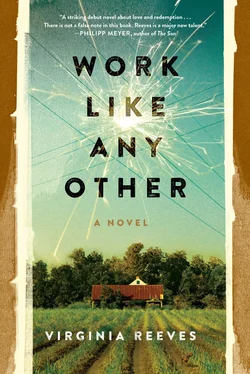In a quarter mile, we pulled onto the rutted drive that led to the house and the barn. The same pecans lined the way, their leaves full and green. The fields stretched out behind them. Everything I saw made me terrified to see the next. The pole fence still ran to the west end of the sling-backed barn, one new rail bright against the weathered others. There was the chicken coop, the chickens. Every piece was there, not much different from how I’d imagined it at Kilby. I’d seen myself walking up that drive, Maggie next to me. “We’ve been hunting rabbits,” I’d heard myself say. I am just a hunter with my dog.
Maggie whined in the back loud enough for us to hear.
“Nice of her to do the speaking for you both,” Wilson said.
Then the house emerged from the oaks. There was the white clapboard and the double porches — top and bottom, as Marie’s father had insisted. The chimneys rose from their opposite sides, the brick seated in place with signs of fresh mortaring. The porches had not sunk with time like so many we’d driven past — an eastern corner sagging toward the ground, a post rotted through, the eave collapsing. The paint was fresh. The same two rockers sat on the lower porch, but they’d been sanded and varnished to look new. They must have been made of strong wood, and I wished Ed were there to tell me the grain.
When I first saw Kilby, I thought it looked like a school with a lighthouse out front, strange things to me both, but that clean farmhouse was unfamiliar, too. We’d never polished the grounds quite that shiny. Even when the money was coming in, we’d left the creepers on the chimneys. Marie had liked them.
Her horse was nowhere to be seen, long dead, I supposed.
Wilson pulled up to the shop and reached across his body to open his door with his only hand. “You sit here a minute if you need to. Supper will be ready soon, and I know Moa’s anxious to set eyes on you, but you get your bearings out here first.” He stepped free of the cab. “You want me to let your dog out? She won’t go after the chickens, will she?”
“No.”
He slammed his door, and I watched him lift one of the wooden rails out to give Maggie leave of the truck bed. She was reluctant to jump down, and Wilson slid that stump of his arm under her waist, his right arm round her neck, lifting her to the ground gentle as a baby.
Wilson had been my friend. We had strung lines and seen crops turn to money and eaten dinners and watched our kids grow. Marie’s father had always hired his help. Marie’s grandfather hadn’t had slaves. Wilson had been a free man his whole life until our arrest.
Maggie was sniffing at his one hand, unsure. She glanced toward the truck cab, and all I could give her was a nod before I looked back at the shop that held my thresher.
Idon’t know how long I sat in the truck, but it stretched long and vindictive like my time in solitary. I got out only when I heard a woman calling my name.
I so wanted it to be Marie. I wanted her to appear before me and tell me she’d needed all that time to think it through — nine years, she needed, all right. But she had realized that I’d acted for her and Gerald, for the farm, even for Moa and Wilson and their children, as much as I’d acted for myself. She realized that I had to have my hands in electricity, that I was driven by all those attractions that lay hidden until ignited. I saw her take me into her arms, letting me bury my face in the thick hair she’d let fall down her back. I could smell the cooking she’d been doing for my return — the maple-and-bacon beans I’d fallen in love with, bread, roast chicken, coffee. I could forgive her silence if she could forgive the work I’d done.
But it was Moa standing near the front door, her hands held tight over her apron. She’d aged more than Wilson — more lines at the corners of her eyes and around her mouth, her hair gone gray along the edges of her face. She was heavier, too, broader.
Maggie rose from where she’d been waiting near the back wheel and followed me to the porch steps.
“I didn’t want him to collect you, you know,” Moa said. “Told him to let you find your own way. Like he did his. Go get yourself a job in a coal mine. See how it suits you.”
“You know I’ve spent time in a coal mine, Moa.”
“With your own daddy as the foreman. You spent most of your time up top.” Moa towered above me. “Wilson has his compassion for you, Mr. Roscoe, but it’s hard for me to see why.” She squeezed her hands tighter, then pulled them apart and slapped them against her thighs. “You took him right down with you, didn’t you? Never even tried to help.”
“I was in prison, Moa. What could I have done?”
“Told them it was your fault.”
“I did that. They didn’t listen.”
Moa lowered her eyes. “He lost his arm, Roscoe.”
“I’d change that if I could.”
“You’ve said your piece, Moa,” we both heard from inside, Wilson’s voice coming through the screen. “Let’s have some supper.”
“That dog’s not welcome in the house.”
“She’s never been in a house.” I put my hand on Maggie’s head as I told her, “Wait.” She lay down on the brick walk, which had been hard-packed dirt before.
The porch was clean and the rockers even shinier up close. Electric lamps graced the sides of the door, and it didn’t squeak when I opened it. Inside, everything was a greater version of itself, too. New wallpaper lined the foyer above the wainscoting, curving vines with starlike leaves and bright orange berries against a pale yellow background. Birds of all colors and shapes sat amid the branches, and in the middle of them, a yellow-orange squirrel held court. The old paper had been dark green and nothing more than an angular pattern.
A new electric chandelier dangled overhead, its crystals bright even when the bulbs weren’t lit. “Marie felt like lightening things up in here,” Moa said. “A while back, we took down all the old paper and put up new. You’ll see on the way to the table. Hang your coat.”
The stand was the same, tall oak with a box for umbrellas and a seat for putting on shoes. Its mirror reflected one of the squirrels just to the right of my head. My face had grown old and thin, and I looked preposterous against that wallpaper, like a tramp brought into a nursery.
“Come on through the sitting room,” Moa said.
I didn’t want to see any more.
The wallpaper in the sitting room was pink and light green, full of flowers and leaves. Gerald’s reading chair in the corner was now rose colored, an electric lamp next to it.
“I would like to sit down.” I went to that chair. I reached instinctively for a small book on the side table, a novel that Rash had forced on the other men, another Melville book about the sea. “It’s about mutiny,” Rash had demanded. “Isn’t that enough to interest them?”
“No.”
“You’ll fall asleep in that chair if you don’t get up,” Moa said. “Come on. There’s food to eat.”
I set the book back on its table and followed them through the wide arch to the dining room. The pink flowers had bled across the walls in there, too.
Moa poured me coffee, which was every bit as good as I wanted it to be. She brought out a whole chicken, then a crock of beans, corn bread, and fresh butter. The canned peaches were brilliant orange in their jar. Moa had cooked up some chard and collards with crisp bits of pork fat. She’d outdone my imaginings, this woman who was not my wife. And on my other side, I didn’t have my son, but rather a man whose arm I had helped to crush and cut loose from his body, whose skin I’d held a flame to in order to stanch the bleeding.
Moa recited from Deuteronomy, one of Chaplain’s favorite passages: “ ‘For the Lord your God is God of gods and Lord of lords, a great God, a mighty, and a terrible, which regardeth not persons, nor taketh reward: He doth execute the judgment of the fatherless and widow, and loveth the stranger, in giving him food and raiment.’ Thank you, Lord, for this food.”
Читать дальше












